A record number of early sightings of bee-eating Asian hornets on Jersey has sparked fears for Britain’s honeybees this summer.
The Asian hornet, recognisable for its dark body and yellow legs, was first seen on British shores in 2016.
It preys on other insects and is said to have wiped out nearly a third of all honeybee colonies in France.
The Department for Food and Rural Affairs (Defra) has made attempts to prevent the species from becoming more prevalent in the UK by setting traps and destroying nests.
However the department is concerned that a warmer spring could boost the numbers of the bee killers.
Around 260 queen Asian hornets had been recorded on Jersey already this year up until last Friday.
It is more than 10 times higher than the same point last year, The Times reported.
John De Carteret, founding member of the Jersey Asian Hornet Group, told The Guardian: ‘We are obviously concerned’.
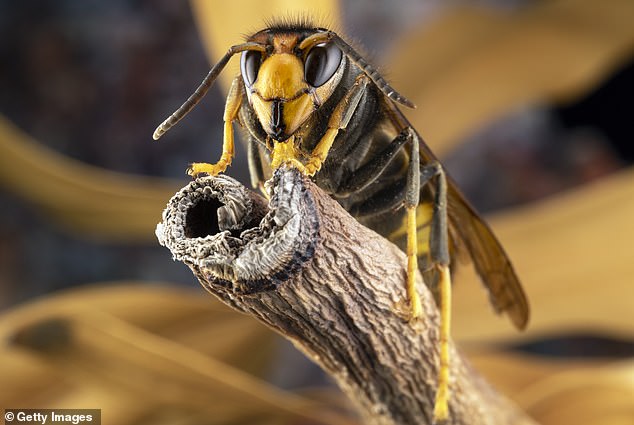
A record number of sightings of Asian hornets has sparked fears for British honeybees
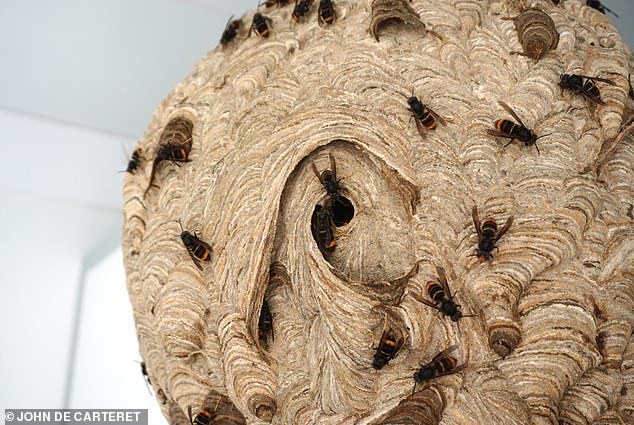
A huge hornets nest found in Jersey, home to the insects which can eat 50 bees a day
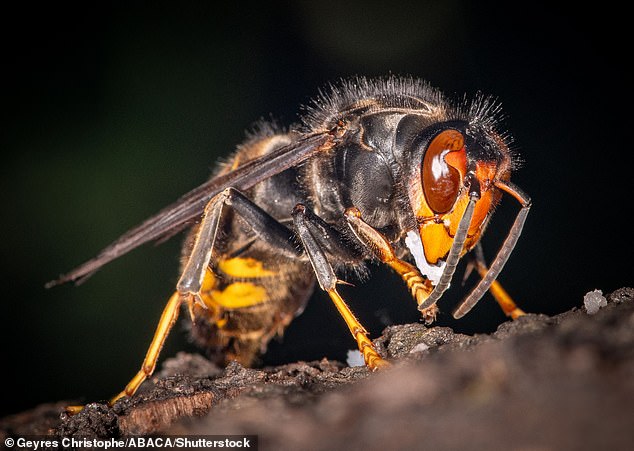
The Department for Environment, Food & Rural Affairs (Defra) has urged members of the public to report sightings of the insects
Members of the public have been asked to report sightings of the insects to Defra using the Asian Hornet Watch app.
They have asked users to record the sightings with a photo if it is safe to take one.
A study published last month by the University of Exeter found that the insect-eating hornets had remnants of around 1,400 different species in their guts – with the most common being the European honeybee.
Last year, it was confirmed that the invasive species had survived a UK winter for the first time.
Government scientists discovered the insects remained in Britain throughout the winter months, raising fears that British honeybee populations could be decimated as numbers increase into the summer.
Concerns have been raised by experts that if the insect does establish itself in Britain, this could have dramatic consequences for our native pollinators.
Ian Campbell, of the British Beekeepers Association, has warned that the UKis at a ‘tipping point’ where the species becomes well established here.
He told The Times: ‘They like social insects (such as honeybees), because social insects congregate in groups — and that’s like an all-you-can-eat buffet for the hornet’.
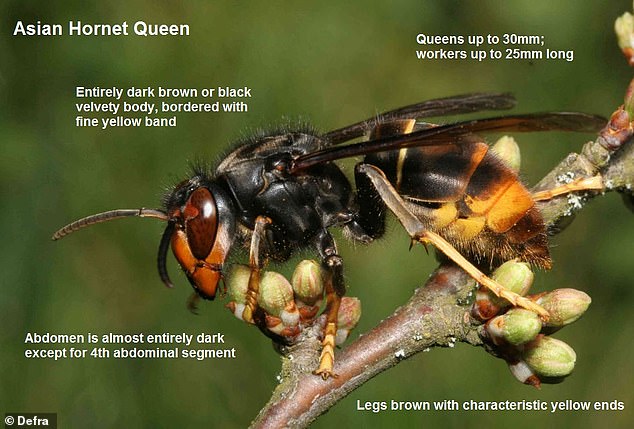
Each nest produces 350 fertilised queens (pictured) each year, every one of these is capable of creating their own nest should they survive the winter
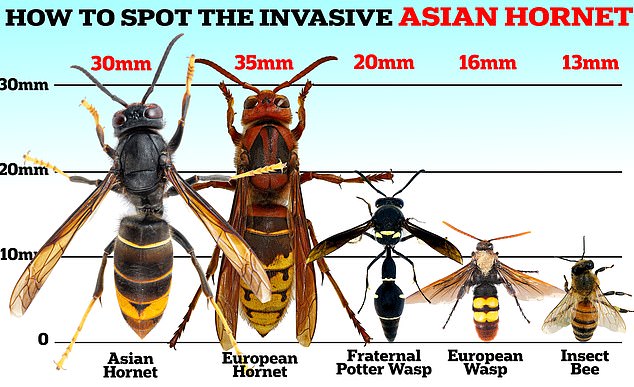
Experts say that Asian hornets are dangerously close to becoming established in the UK. Members of the public have been urged to be vigilant for the invasive species
Mr Campbell told the newspaper that if they did become established in the UK, that some beekeepers in the worst-affected areas may give up.
The insects do not threaten human health but can destroy bee hives and affect populations.
According to the British Beekeepers Association, an Asian hornet can hunt down and eat between 30 to 50 honeybees a day and their habit of hawking or hovering outside the hive stops bees from collecting nectar and pollen to feed themselves.
The species arrived in France in 2004 and have since spread across the continent. There is an estimated 500,000 Asian hornet nests in France.
To make matters worse, in 2022 France experienced a ‘surge year’ which caused the Asian hornet population to grow rapidly.
It was previously reported by MailOnline that Kent had become a hotspot for Asian hornets, where 38 of the 52 hornet sightings in 2023 took place.
For years, the number of Asian hornets in the UK remained low with only one or two being spotted each year.
However, in 2023 the number of hornet sightings suddenly exploded.
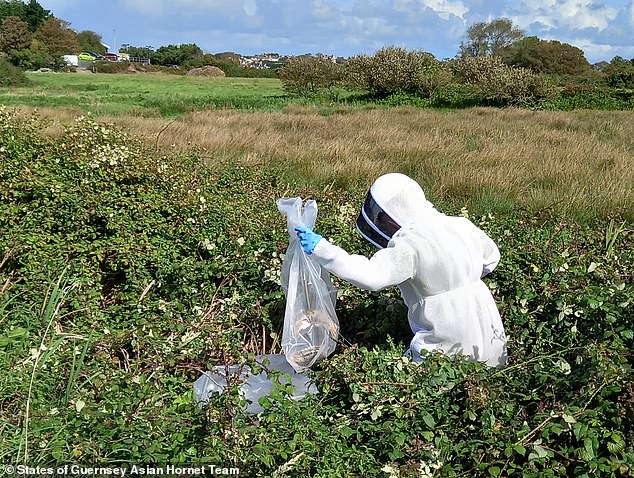
Concerns have been raised by experts that if the insect does establish itself in Britain, this could have dramatic consequences for our native pollinators
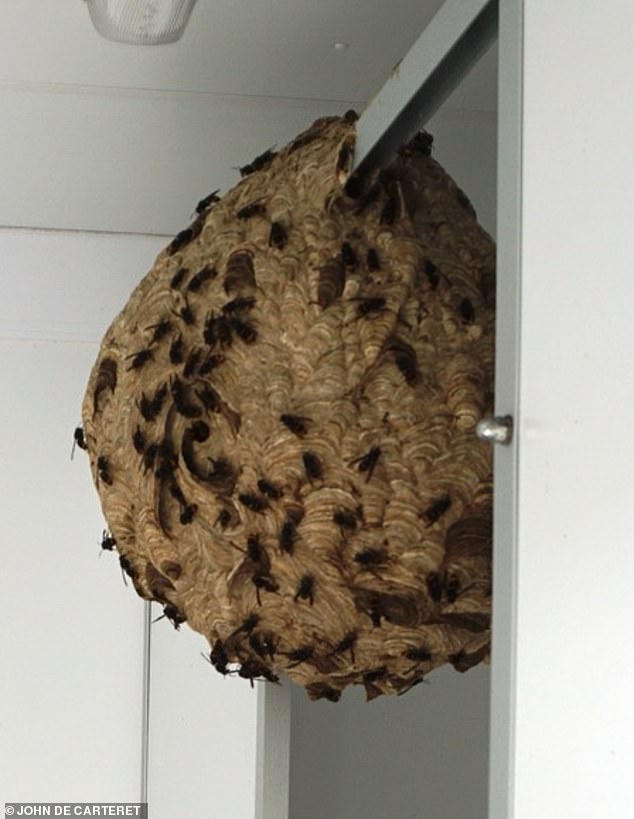
A huge nest was discovered in toilets which were open to the public in Jersey in 2022
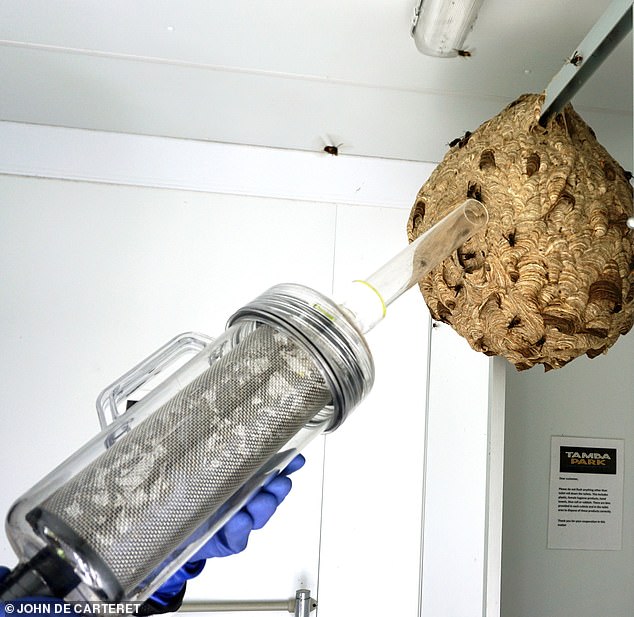
Hunters said the hive was about to produce queens, which would have spread and built more hives elsewhere
In just 12 months, The National Bee Unit destroyed 72 nests in 56 locations compared with just a single nest the year before.
The vast majority of those sightings were clustered along the southern coast, particularly in Kent and East Sussex.
In the seaside town of Folkestone – the UK’s hornet capital – a staggering 21 nests were destroyed in 2023.
However, Asian hornets have been spotted further north, with one nest even being destroyed in Hackney, east London.
Nests have also been found and destroyed in North Yorkshire, Suffolk, Hampshire, Hull and Dorset.
The insects have a dark brown or black velvety body, with a characteristically dark abdomen and yellow-tipped legs.
European hornets, meanwhile, are mainly yellow with small black stripes and orange legs.
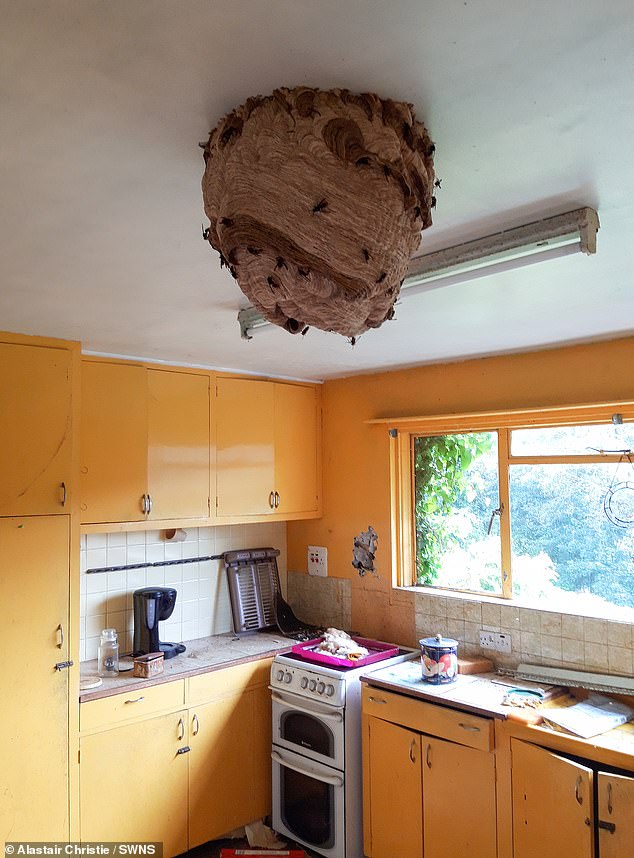
One of the largest Asian Hornet nests ever found in the British Isles – measuring about 15 inches (40cm) – was found growing in a derelict house
Asian hornet nests start off very small, with a queen building a tennis ball-sized shelter.
She then begins building a workforce, and a secondary nest is then built around the original shelter, and can be up to a metre wide.
Mr Campbell previously told MailOnline that Kent is on ‘the front line’ of the hornet invasion due to its proximity to France.
As long as France has a large Asian hornet population the insects will continue to arrive in the UK, but the bigger risk is that they become established here permanently.
Mr Campbell says that there is ‘a significant risk’ that Asian hornets will establish a permanent breeding population.
He says: ‘They’re an apex predator, they are very successful, they are very adaptive, and the climate presents no problems for them – it’s rich pickings for them.’







